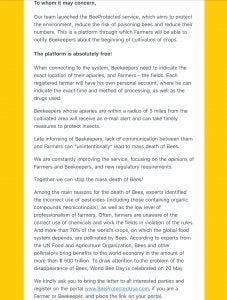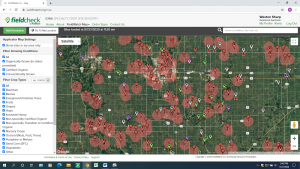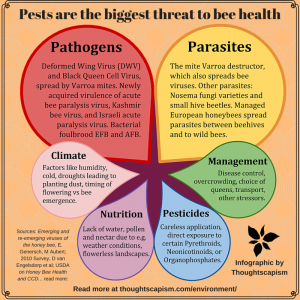Do you ever get an email in your inbox and think: “Who the heck wrote this, and what were they thinking? How did this person get hired to write this copy, and how did this get approved by their team?”
Below is the email screenshot from a company called BeeProtected regarding its services. Oh boy, here we go. This is why I drink.
Get a load of this “BEE.”S. (B.S. ??)

Uhm … what … is this a joke? “Low level of professionalism?” Treating farmers like they don’t know how to do their jobs? Excuse me, Mr. Mass Produced Email Blast, who clearly didn’t know who you were sending this to, the only “low level of professionalism” I see is an insulting email with no citations of claims, while using language that would never be used in agriculture in the first place.
“Drugs?” “Poisons?” This what you’re accusing farmers of doing, but yet you want to work with us?
Yeah … sorry. That’s not gonna fly. It’s probably not a good idea to insult your potential customers and partners. And for the record, no one in agriculture would use “drug and poison” to describe what we do. Pesticide? Sure. Crop protection product? Most likely. And what BeeProtected is trying to do already exists — from FieldWatch, a credible non-for-profit platform with solid members that is professional and respectful to farmers, the environment, and apiaries alike.
Speaking of “fly,” a lot of products farmers spray on their crops are applied by trained, licensed professionals like ag pilots. To further weigh in, I spoke to Wes Sharp, Vice President of the Iowa Agricultural Aviation Association, who explained the “Bee Law,” which his Dad actually helped write. The law, partnered with FieldWatch, is a regulation that has been successful in this arena to help protect bees and fields alike. It’s basically a communication requirement for beekeepers to register their hives and for farmers to give notice if they’re about to spray anything that could potentially harm their bees. In that instance, insecticide cannot be sprayed on blooming crops between 8 a.m. and 6 p.m., while the insects are foraging. For Sharp, he has a three-hour window each day to spray these products — in the very early morning or late evening. It works for everyone.
He explains that during the busy season as a professional pesticide applicator, he uses this website on a daily basis to get the job done. This is an example of how the site looks, which is a guide to know where the bees are located so he can protect them as best he can.

It’s a one-stop shop guide on where and when he can and can’t spray. Being mindful of pollinators, organic fields, different crops, etc., is all part of his job. He says, “We are all part of the same ecosystem. Farmers fields need to be protected, just like the bees need to be protected.”
I couldn’t agree more. On our farm — and pretty much every farm — we must hold registrations, certifications, licenses, go through ongoing trainings and renewals, and so much else to apply crop protection products. We can’t just go out and spray willy-nilly! It makes the email blast’s statement, that “farmers are unaware of the correct use of chemicals and work the fields in violation of the rules,” all that much more absurd and defamatory.
Whether the farmer is a professional applicator himself like we are on our farm, or hires the help of outside ground rigs or airplanes, the bees are very important to us.
That’s pretty much the only thing this absurd email blast got right — that the bees are crucial, and many of the world’s crops are dependent on them. So if farmers need bees, why would they jeopardize them? It’s in the farmer’s best interest to keep the bee population on the rise and healthy as ever. Different companies and groups utilize many different programs to protect our pollinators and here is one more example from the Iowa Department of Agriculture and Land Stewardship.
And that’s another thing. Another false premise the email above eluded to is that the bees are dying in mass quantities. Do bees have problems? Sure! The varroa mite has been the biggest negative contributing factor to bee health, and, by comparison, pesticide application has played a much smaller role. And if you look at the actual USDA data, honeybee populations are actually on the rise.

Bees need farmers and farmers need bees. So we’ll continue to protect them, without help from the company in the above email blast.
Michelle Miller, the Farm Babe, is an Iowa-based farmer, public speaker, and writer, who lives and works with her boyfriend on their farm, which consists of row crops, beef cattle, and sheep. She believes education is key in bridging the gap between farmers and consumers.



